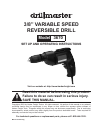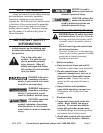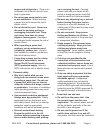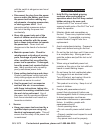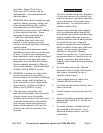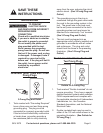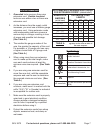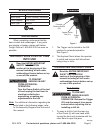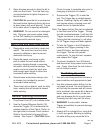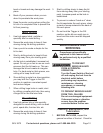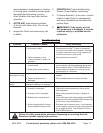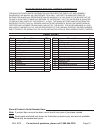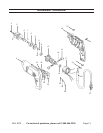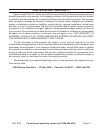
Page 10For technical questions, please call 1-800-444-3353.SKU 3670
bend or break and may damage the work
piece.
5.
about to penetrate the work piece.
Keep the motor running when pulling the 6.
bit out of a completed hole to prevent the
bit from jamming.
Metal Drilling
Use high speed steel, carbide or 1.
specialty bits for metal drilling.
Secure the work piece to keep it from 2.
moving during the drilling operation.
Use a punch to create a dimple for the 3.
bit to start.
Start by drilling slowly to keep bit from 4.
moving away from your starting point.
As the hole is established, increase tool 5.
speed. Do not go so fast or use so much
pressure that the bit heats up. This can
damage the bit and create an irregular
hole. For hard metal or thick pieces, use
cutting oil to keep the bit cool.
Since drilling in metal is a slow operation, 6.
you may lock the Trigger in the ON
position to maintain a constant speed
and reduce fatigue.
When drilling large holes in metal, start 7.
by drilling a smaller pilot hole, then using
Wood Drilling
Use high carbon bits or bits specially 1.
designed for wood drilling, such as brad
point, spade bits, forstner bits, etc.
Secure the work piece to keep it from 2.
moving during the drilling operation.
Start by drilling slowly to keep the bit 3.
from moving away from your starting
point. Increase speed as the hole is
established.
To prevent or reduce “break out” when 4.
the bit penetrates the work piece, clamp
a piece of scrap material to the back of
the work piece.
Do not lock the Trigger in the ON 5.
position, as the bit can easily jam in
wood and the motor must be stopped
quickly.
MAINTENANCE AND
SERVICING
Procedures not specically
explained in this manual must
be performed only by a qualied
technician.
TO PREVENT
SERIOUS INJURY
FROM ACCIDENTAL
OPERATION:
Turn the Power Switch of the tool
off and unplug the tool from its
electrical outlet before
performing any inspection,
maintenance, cleaning
procedures, or removing/
attaching bits.
TO PREVENT SERIOUS INJURY
FROM TOOL FAILURE:
Do not use damaged equipment.
If abnormal noise or vibration
occurs, have the problem
corrected before further use.
Cleaning, Maintenance, and
Lubrication
BEFORE EACH USE,1. inspect the
general condition of the tool. Check for



